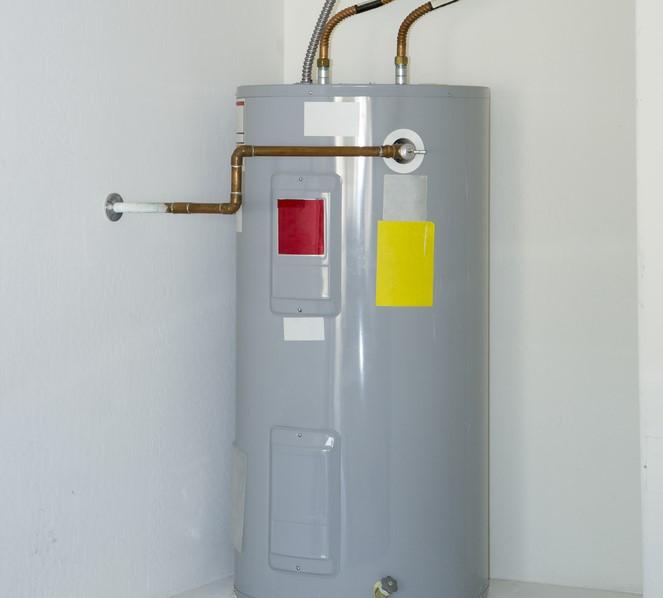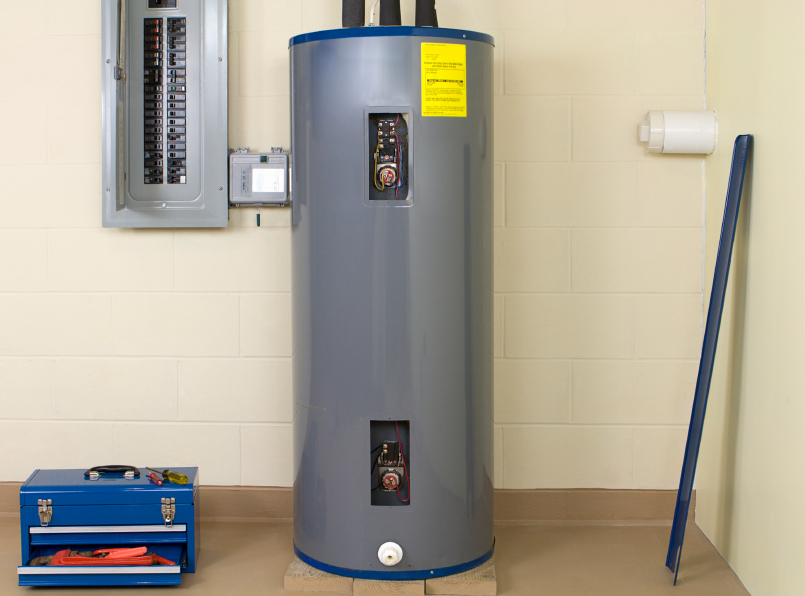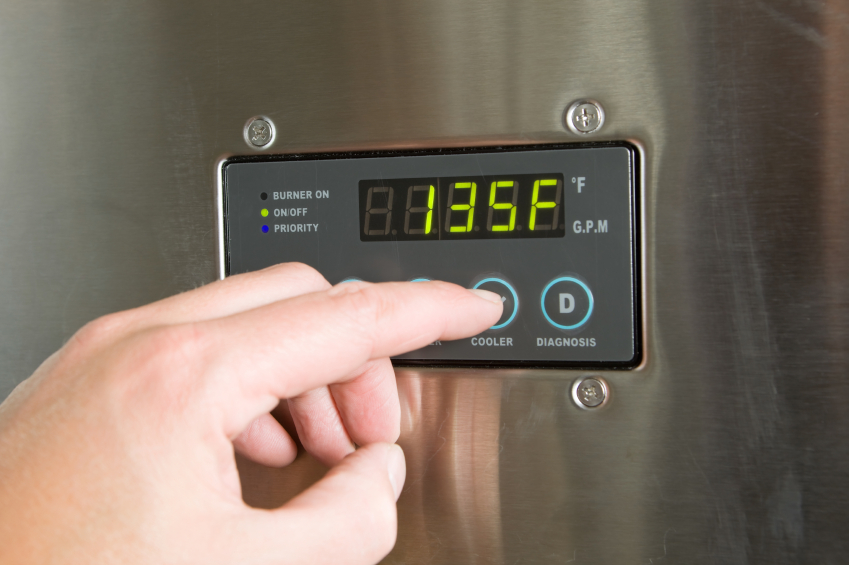Install Electric Heat Pump Water Heater
Electric heat pump water heaters are now installed more often than gas water heaters, and for good reason! Electric heat pump water heaters are highly efficient, which means they save energy and money. A heat pump water heater works just like an air conditioner, but in reverse. Heat pump water heaters look just like a regular tank water heater and can easily replace most conventional water heaters. They also reduce climate and air pollution since they can be powered by clean, renewable electricity! In fact, if you have a gas or fuel oil water heater now, this is one of the most important actions you can take to reduce climate pollution as it makes a change that will last far into the future.
Your Impact
Action Steps & Tips
Introduction
 If it’s time to replace your water heater, you can generally save money, energy, and significantly lower your impact on climate by switching to an electric heat pump water heater. A Heat Pump Water Heater is a highly efficient electric water heater. It looks just like a regular water heater with a storage tank, the only difference is how it heats your water.
If it’s time to replace your water heater, you can generally save money, energy, and significantly lower your impact on climate by switching to an electric heat pump water heater. A Heat Pump Water Heater is a highly efficient electric water heater. It looks just like a regular water heater with a storage tank, the only difference is how it heats your water.
A heat pump water heater works just like an air conditioner or refrigerator, but in reverse. It takes the warm air from around the heater and uses that to heat the water. This process is much more efficient than regular electric water heating, actually up to 63% more efficient. This can create significant savings in energy, money, and impact.
Most importantly—this is one of the top actions you can take to reduce your climate impact. First, electric water heaters can be easily powered by clean, renewable electricity. However, if you are switching from a natural gas, propane, or fuel oil heater, this action has even more impact. Switching from fossil fuel to electric units is one of the most important actions we can take—it creates the infrastructure to run our homes on clean renewable energy into the future. Read on to learn more about heat pump water heaters.
11. Cost, savings and when to upgrade
Water heaters often break suddenly, so it’s good to prepare ahead of time. Here are some factors to consider:
Savings. Heat pump water heaters are so efficient that if every household in the U.S. used a heat pump water heater, the energy cost savings would top $8.2 billion a year, according to Energy Star. Average savings on annual operating costs for a household of 4:
-
Replacing a regular (resistance) electric tank water heater: Saves up to $400 a year or more, generally 60% off your current water heating bill
-
Replacing a gas tank water heater: Saves up to $100 a year or more, depending on the relative prices of electricity and gas where you live. There are a few locations where it is break-even or slightly more expensive to operate than a gas heater.
-
Replacing a gas tankless water heater: Save up to $75 a year or more, depending on the relative prices of electricity and gas where you live.
Cost. Electric heat pump water heaters are tank heaters and look just like traditional gas and electric water heaters. However, they are much more efficient. They cost more to install initially (before rebates) depending on your current set up and choice of power options:
-
Heat pump water heaters cost more upfront:
-
$1,500-$2,000 for a 50 gallon tank
-
$2,000-$2,500 for an 80 gallon tank
-
For comparison, gas or traditional electric water heaters run $500-$1,500.
-
-
Installation costs vary depending on a few factors:
-
Electrical outlet requirement: Most heat pump water heaters run on 240V, however, there are a few new models that run on 120V.
-
If you have an electric water heater now, you likely already have a 240V outlet ready to use.
-
If you are switching from a gas or fuel oil water heater, you may have the one time cost of installing a new 240V outlet. Or you can choose a 120V model.
-
If you choose to install a new 240V outlet, this could trigger an expensive requirement for an electrical panel upgrade if you have an older home or lower amp panel. In this case, choosing a 120V tank would avoid this extra cost. (However, if you are also planning to add heat pump space heating and an EV, you may need to do the panel upgrade anyway.)
-
-
Heat pump water heater location requirements:
-
Are generally the same size as traditional water heaters, sometimes a few inches taller. They do not require venting.
-
They require sufficient airflow. If your current water heater is in a small cabinet, you will need to vent the cabinet or choose a new location for your water heater.
-
The best practice for energy efficiency is to have the water heater in an area that has a surrounding temperature of 40 degrees or more.
-
If you need to move your water heater to a new location, there may be additional installation costs.
-
-
Overcharging. Heat pump water heaters are relatively new and not all plumbing companies are familiar with them yet. With this novelty, there is a trend to overcharge for installation. Heat pump water heaters are tank water heaters and the installation is similar to a traditional electric water heater. If you find that you are being charged more than seems reasonable, one option is to purchase your water heater directly from the hardware store and have it delivered and only pay for the cost of the installation. This often reduces the overall cost of installation. Ask for an installation only quote to compare and confirm this service option before ordering your water heater directly.
Rebates. There are rebates and incentives for heat pump water heaters depending on where you live. Check the resources below or with your local utility or city for more information. These incentives can be substantial and often cover the extra cost for the install, making it cost- effective to switch. There are also incentives for electrical panel upgrades available in some areas
Prepare to upgrade. Water heaters tend to stop working suddenly without much warning. The best time to upgrade your water heater is when it stops working. However, if you are switching from gas or fuel oil to a heat pump water heater and need to install a new electrical outlet, it is best to plan and do this ahead of time. The lifespan of a water heater is generally around 10 years, so if you are close to this or past 10 years, it’s time to prepare.
22. Choose your new water heater & install
Here are a few things to consider for your heat pump water heater installation:
Hire a professional. Before you choose a water heater, hire an experienced plumber to help you decide on your options. However, be aware that heat pump water heater options are new and not all contractors are familiar with them. If possible, look for a contractor that has experience with heat pump water heaters so they can give you the best advice.
Sometimes if an installer is not familiar with heat pumps they will just try to talk you out of installing one. Don’t let this happen! Let them know that you are interested in both the efficiency and savings and also in the impact on climate and air pollution. If they are not taking your request seriously and trying to help you understand your options, find another installer. Electric heat pump water heaters are very similar to other tank water heaters and any experienced plumbing company should be able to perform an install. If you are their first heat pump water heater installation, thank them for supporting you in choosing this important option!
Size. Most likely, you can pick the same size tank as your current water heater. Bigger water heaters require more energy to heat, so consider how much hot water you really need—especially if you plan to also adopt more water-wise behaviors. It could be a great time to lower your energy use even more! If you need help choosing a water heater size, learn how on the Energy.gov website (scroll down to the heat pump section).
Choose a model. Look for a model with a high Universal Energy Factor (UEF) number, which indicates it has a higher energy efficiency rating. Also, ask your contractor for input on choosing a model. Heat pump water heaters are called “hybrid” water heaters because they come with the option to automatically switch to regular electric heating during periods of high hot water use or cold temperatures.
33. Choose the best settings and maintain your HPWH
Congrats! Here are a few tips now that you have your new heater:
Choose the best settings. Your heat pump water heater likely has a control panel that allows you to select from different modes. Here are a few common options:
- Efficiency/Economy: This mode only uses the heat pump to heat water and maximizes energy efficiency and savings, but it can take longer for your water to heat up with high demand or lower temperatures.
- Auto/Hybrid: This is usually the best default setting. It provides energy-efficient water heating first, but will switch to the standard electric heat element if it’s too cold to use the heat pump, or if you need to heat water faster (everyone wants to shower at the same time). This is the best setting for comfort and convenience.
- Electric/Heater: This mode is the least energy efficient and operates as a standard water heater, relying on only the electric element to heat water.
- Vacation & Timer: This option may not be available on all models. If you have this setting you can put your unit in a “sleep” mode which saves energy while you are away.
Maintain your new heat pump water heater. Maintain your new water heater properly to keep it working efficiently. Check the manufacturer’s guide for the recommended maintenance of your unit.
Recycling your old water heater. Your old water heater is made of metal that can be recycled. Often your installer can recycle it for you. Check to make sure they plan to recycle it. If you are not sure, check with your city or recycling hauler for information on local recycling options. Many cities have recycling programs that accept large appliances and may even offer a curbside pickup option.
Extra credit: Set your water heater to 120 degrees and save even more money and electricity! Learn more on the Turn Water Heater Temp Down action.


